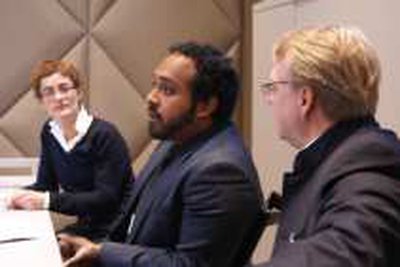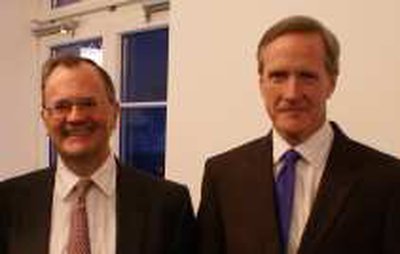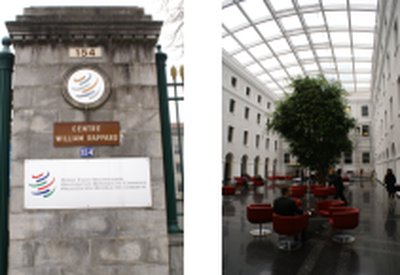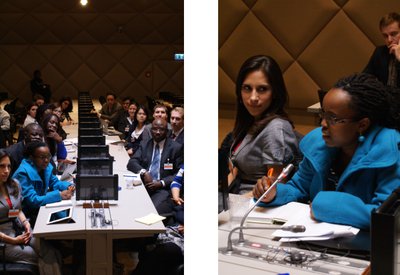5 Mar 2013
A Three-Day MILE Experience inside the World Trade Organization
From 25-27 February, the World Trade Organization (WTO) opened its doors to the MILE 13 class during the WTI’s annual excursion to Geneva.
Students were taken behind the scenes into one of several meeting and translation rooms. They listened to and asked questions of senior speakers from the Advisory Centre on WTO Law, the World Trade Organization as well as from former MILE students. The purpose of the event was to gain insights into working for and with the WTO, learn about the most prominent issues currently facing the Organization and establish connections that could potentially lead to employment opportunities upon completing the MILE Programme.
Jan Bohanes of the Advisory Centre on WTO Law (ACWL) outlined the scope of his work as providing advice to developing countries and LDCs on legal matters dealing purely with WTO law, leading dispute prevention and conducting trainings. Trade lawyer and Professor Ricardo Ramirez, shared his day-to-day experiences as a member of the WTO’s Appellate Body and its role in the professionalization of dispute settlement. He invited MILE students to attend an upcoming dispute case hearing about measures affecting the renewable energy sector. Expanding on the topic of energy, WTO Deputy Chief of Staff, Doaa Abdel Motaal, spoke about the issue of climate change in the international trade framework. She explained the struggle that countries face by trying to place a cap on carbon emissions while remaining competitive in the international trading system and adhering to WTO rules. Keith Rockwell, WTO Director of External Relations gave an overview of the wide range of issues he communicates on as a spokesperson for the Director General, for each individual WTO member and for the Organization as a whole. In his view, the WTO’s approach to increasing transparency of the topics it addresses has played a role in how the public views the Organization.
One of the most frequently-discussed issues during the course of the visit was the appointment of the WTO’s next Director General. Nine candidates were nominated by their governments in December 2012 to potentially succeed the current Director General, Pascal Lamy, as of September 2013. Deputy Director General Rufus Yerxa outlined how the Organization is structured and recalled that all decisions – including this crucial one – must be reached by consensus by the Organization’s 158 member governments. Victor do Prado, a MILE faculty member and Director of the WTO’s General Council Division, addressed the specifics of the DG selection process. Ambassador Joachim Reiter, Sweden’s Permanent Representative to the WTO and a member of the troika of Ambassadors leading the consultation process for the selection of the next DG, stated that a decision would be reached by 31 May 2013. He felt that the coincidence of the DG selection process with the looming Ministerial conference scheduled to be held in Bali would leave little time for a new senior management team to influence the Ministerial meeting’s outcome and that much of the burden of success lied with Members. Momentum at the WTO needed to be restored quickly in his view given the lessened attention multilateral negotiations have assumed in the daily activities of trade ministers.
In addition to interacting with WTO officials, MILE 13 students heard from several alumni during their stay. Ravi Soopramanien, Mathabo le Roux, Sainabou Taal, Ankur Mahanta and Chi Le Ngo spoke about their experiences during the MILE Programme and how it had given them the operational expertise to secure coveted internships, consultancies and full positions within the WTO and other leading Geneva-based trade agencies. Echoing the advice of the MILE’s Director of Studies, Pierre Sauvé, the alumni counselled students to choose their thesis topics and supervisors with care. The latter could become critically important intermediaries in their future career paths.
At a MILE alumni reception held at the WTO on 25 February, MILE 13 students were able to test their networking skills. They introduced themselves to alumni and mingled with WTI professors and WTO staff members. MILE alumni – in turn – exchanged stories with former colleagues and professors and helped open doors for the next class of WTI graduates.





